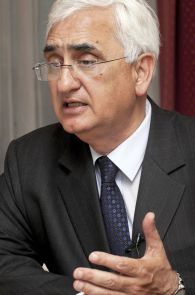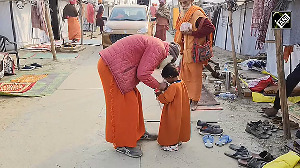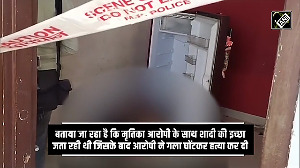 External Affairs Minister Salman Khurshid arrived in Beijing on Thursday on a two-day visit to hold talks with Chinese leaders, just days after the resolution of a row over Depsang Valley in Ladakh, where the troops of People's Liberation Army intruded recently.
External Affairs Minister Salman Khurshid arrived in Beijing on Thursday on a two-day visit to hold talks with Chinese leaders, just days after the resolution of a row over Depsang Valley in Ladakh, where the troops of People's Liberation Army intruded recently.
Besides talks with his counterpart Wang Yi, Khurshid is expected to meet new Chinese Premier Li Keqiang, who is planning to visit India later in May, making it the first stop of his maiden foreign tour.
Ahead of the visit, he told Chinese media in New Delhi on Wednesday that he was satisfied with the maturity and understanding shown by the two sides in trying to resolve the issue, referring to the stand-off that ended on Sunday.
"To keep them (disputes) at a proportional level and contain them as limited and localised, and not necessarily part of large scheme of things, it's important to have a fundamental understanding of each other. We have developed that for years and that's a wonderful thing," state-run China Radio International quoted Khurshid as saying.
Terming his visit as a great opportunity, he said India and China had developed a very sound relationship over the past decade, and expressed hope that bilateral ties would be enhanced under China's new leadership.
"The first signals that have come from the new Chinese leadership are extremely positive and welcome and will reciprocated in full substance from us. We are looking forward to a meaningful decade working with the new leadership of China," he said.
Khurshid's visit came under shadow earlier as the two countries grappled for a fortnight to resolve the row over the PLA troops incursion in the Daulat Beig Oldi in Ladakh, 19 km within the Indian side of the border.
After initial assertions by China that there was no violation of border by its troops, the row was resolved on Sunday following intense round of talks at various levels.
The Chinese foreign ministry on Wednesday called for "proper and timely" settlement of the boundary issues to preserve peace at the borders in the light of the Depsang Valley row.
"Proper and timely settlement of border issues serves the common interests of both the countries and is also their common aspiration," Foreign Ministry Spokesperson Hu Chunying told reporters.
"The handling of the incidents also shows that the two countries agreed to protect the safety and security and peace of border areas and it is also the result of joint efforts," she said.
"We would like to continue to work with the Indian side to safeguard peace and stability of the border areas for sound and steady development of China and India relations."
During his stay in Beijing, Khurshid is also expected to meet State Councillor Yang Jiechi, widely speculated to be a successor to Dai Bingguo, who retired recently as former Special Representative on the India-China border talks.
Besides the border row, the two sides were expected to discuss a host of subjects including India's concerns over ballooning trade deficit.
The details of Li's visit to India were also expected to be finalised during the talks.
Commenting on Khurshid's visit, Zhao Gancheng, head of the Centre for South Asian Studies at the Shanghai Institute for International Studies, told the Global Times that the recent border stand off shows that although existing border-related mechanisms were proved effective in defusing tensions, they "failed to solve the dispute in a timely manner."
"The level of personnel involved may be too low, which prevents the mechanisms from displaying their best potency," he told the paper.
Ma Jun, a researcher at the Academy of Military Science of the PLA, said it's unlikely the stand-off will be the last border dispute between China and India, but they have strong willingness and a mature dialogue mechanism to handle it.
Khurshid's visit reflects that the incident has not cast a cloud over the developing trend of bilateral relations.
"It will also provide an opportunity for the two sides to better address such problems," he told state-run China Daily.











 © 2025
© 2025